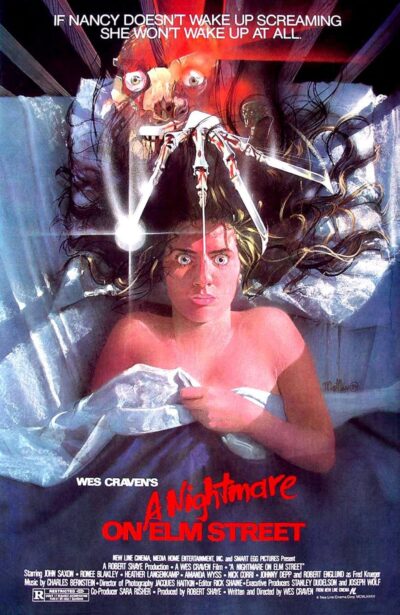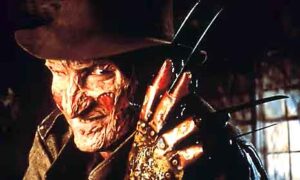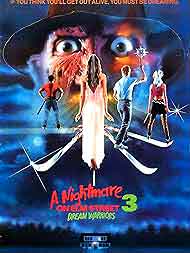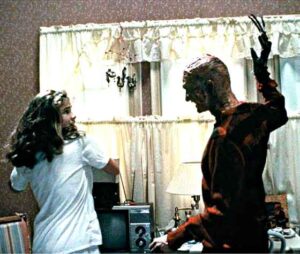Here’s a film whose true allure simply won’t be comprehensible to anyone who wasn’t around in 1984. Written and directed by Wes Craven and produced by New Line Cinema honcho Robert Shaye, A NIGHTMARE ON ELM STREET was a massive low budget success, and responsible in large part for elevating New Line from a scrappy distributor of foreign films (such as Bertrand Blier’s CALMOS, which New Line renamed FEMMES FATALES, and the Brazilian fantasy MACUNAIMA, which Shaye released as JUNGLE FREAKS) to the powerful independent studio it became.
Speaking as one who snuck in to see A NIGHTMARE ON ELM STREET on his twelfth birthday (meaning I fell short of the intended teen demographic, but not by much), I can attest that it played much differently in ‘84 than it does now. Its impact has obviously been diluted by the many sequels, and 2010 remake, that followed; the consensus seems to be that none of those sequels match the original NIGHTMARE ON ELM STREET, whose writer-director lost control of the franchise after its release (although he regained it in 1994 with WES CRAVEN’S NEW NIGHTMARE).
In many respects, however, the sequels, particularly A NIGHTMARE ON ELM STREET III: DREAM WARRIORS (1987), actually outdo the original film. They more fully explore the dream worlds Craven lacked the resources to properly depict, and amplify the devilish charisma of its antagonist Fred—or as he’s better known, Freddie—Krueger, who in the first ELM STREET largely keeps to the shadows.
Dreams were a popular subject in early 1980s genre fiction (in novels like DEATH BY DREAMING by Jon Manchip White and INCARNATE by Ramsey Campbell) and film (in DREAMSCAPE, whose theatrical bow occurred mere weeks prior to NIGHTMARE’s November 11 release) and exploited to the utmost by Craven. His teenaged heroine Nancy Thompson (Heather Langenkamp) finds herself and her friends suffering nightmares involving Krueger (Robert Englund), a horrifically burned fellow who wears a top hat and striped shirt, and wields a glove with knives on its fingers.
After her friend Tina (Amanda Wyss) dies a gory sleep death Nancy becomes obsessed with learning the identity of the dream-killer. Turns out it’s a local child murderer who was burned to death by a group that included Nancy’s mother Marge (Ronee Blakley), who assures her daughter that “he’s dead now because mommy killed him.” This doesn’t stop the undead Krueger from killing Tina’s boyfriend Rod (Nick Corri) and Nancy’s own BF Glen (Johnny Depp), inspiring Nancy, in an arc lifted from Craven’s earlier features LAST HOUSE ON THE LEFT (1972) and THE HILLS HAVE EYES (1977), to launch an elaborate counterattack on Krueger, and in so doing taunt him with the name, “Freddie,” under which he’s become known.
Of the many things presently keeping this film from the greatness that (to me) it once possessed, three in particular stand out. The first is the non-budget, evident in the cheap lighting and dream sequences whose major characteristic is poorly diffused smoke, and the second the acting; I’m not sure that what NASHVILLE’S Ronnie Blakely, as Nancy’s mother, does here can properly be called “acting,” and Johnny Depp’s film debut was frankly pretty inauspicious. Third: the quintessentially 1980s synthesizer score, which more than any other factor dates the film appreciably.
A NIGHTMARE ON ELM STREET, however, has one crucial attribute: a great villain. Fred Krueger was unforgettably essayed by Robert Englund, who despite a dearth of screen time has at least two impeccably delivered lines (“No running in the halls!” and “I’m your boyfriend now, Nancy!”) that were quoted at great length in schoolyards throughout America.
Plus, Craven’s low budget ingenuity still manages to impress. Krueger’s elongating arms with their razor blade fingers screeeeeeech-ing along walls and his unmistakable form imprinting itself in the sloped ceiling over Nancy’s bed remain powerfully elemental sights that linger in the mind and, I’d argue, contributed mightily to A NIGHTMARE ON ELM STREET’s monster success.
Vital Statistics
A NIGHTMARE ON ELM STREET
New Line Cinema
Director: Wes Craven
Producer: Robert Shaye
Screenplay: West Craven
Cinematography: Jacques Haitkin
Editing: Pat McMahon, Rick Shaine
Cast: Heather Langenkamp, Robert Englund, Johnny Depp, John Saxon, Ronee Blakley, Amanda Wyss, “Nick Corri” (Jsu Garcia), Charles Fleischer, Joseph Whipp, Lin Shaye, Joe Unger, Mimi Meyer-Craven




